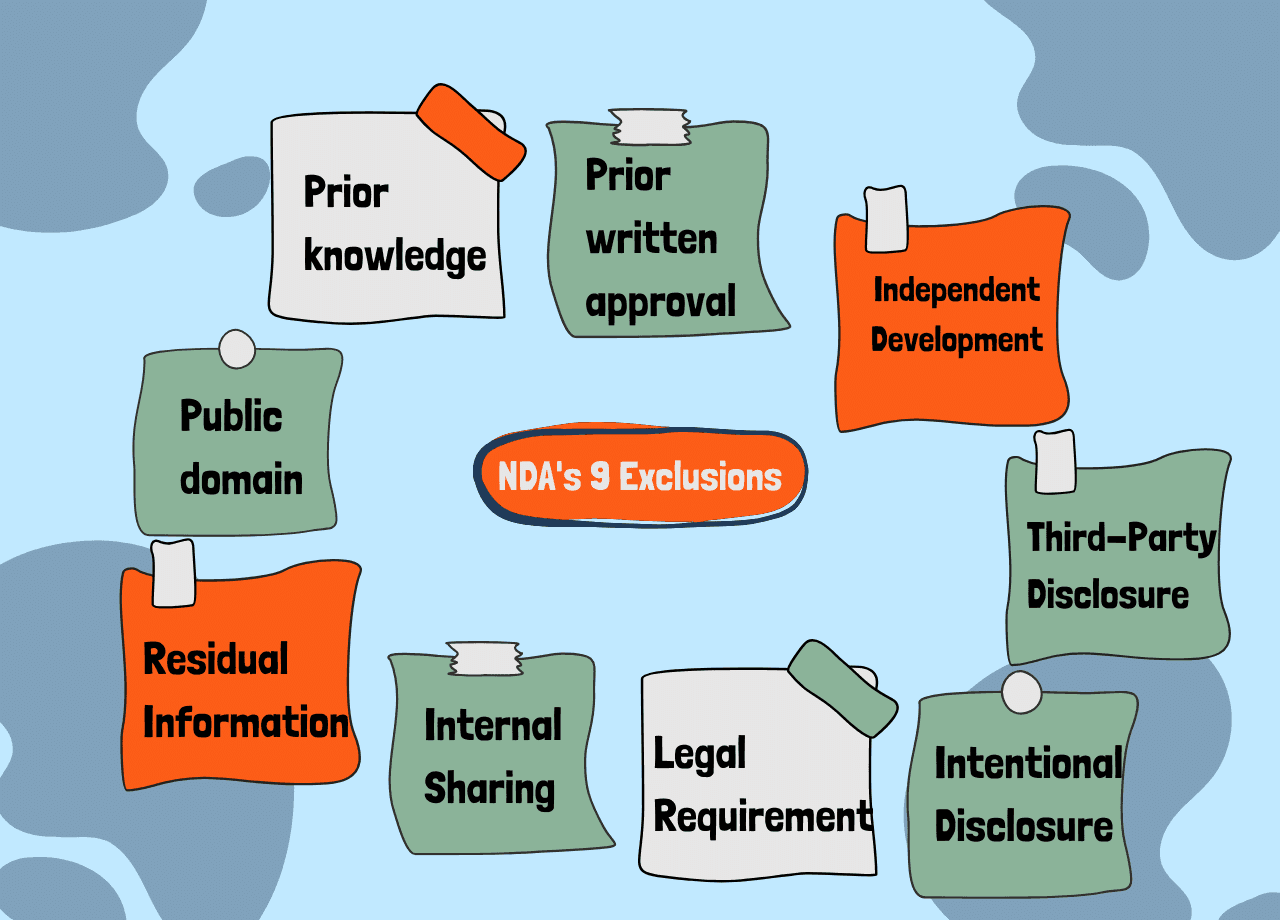
9 種保密合約的例外條款 NDA's 9 Exclusions
2024年4月8日
從當年剛畢業的公司小法務到現在的法律翻譯外包譯者,比較合約各種寫法一直是我的興趣。感謝來自不同時區的客戶讓我有機會見識到各類合約,去年初為協助客戶中翻英所需,參考了許多英文合約與文件資料庫(Law Insider 好用!大推),讓我希望能在工作之餘,把參考資料整理整理,與同行分享一下。
保密合約 NDA 算是最火紅的合約型態
無論資深資淺,幾乎每個法務都會經手。當然法律就是有原則就有例外,NDA 例外之處的拉扯(Discloser 揭露方 V.S. Recipient 接收方),可以說是精彩絕倫。而通常,這種例外條款不外乎是以兩種方式寫,一種是把接收方獲得的資訊拉出機密資訊界定範圍,也就是「一旦資訊屬於這種情況,就不算是機密資訊囉!」,經典寫法像是「Confidential Information shall not include information which:符合下述條件之資訊非屬保密資訊:」;而另一種是明定接收者在何種情況下可以不受到保密義務的拘束,寫法像是「The confidentiality obligations shall not apply to the following information:符合下述情況的資訊將不受保密義務之約束:」
話不多說,我整理了九個 NDA exclusion clauses 例外條款 ,一起看看吧!
例外一:Public domain 公眾領域資訊
The information was in the public domain at the time it was disclosed or enters the public domain without violation of this Agreement by the Recipient.
該資訊在揭露時已屬公眾領域資訊,或在接收方未違反本協議的情況下成為公眾領域資訊。
例外二: Prior knowledge of the Recipient 接收者既有資訊
The information was known to the Recipient, without restriction, at the time of the disclosure.
該資訊在揭露時,接收方已在無限制的情況下知悉該資訊。
例外三:Prior written approval of the Discloser 揭露方事前書面同意資訊
The information is disclosed with the prior written approval of the discloser.
該資訊在揭露時,已獲揭露方事前書面同意豁免。
例外四:Independent Development by the Recipient 接收者自行開發資訊
The information was independently developed by the Recipient without any use of the Confidential Information
該資訊由接收方在未使用任何機密資訊的情況下,獨自開發而得。
例外五:Third-Party Disclosure 資訊由第三方所揭露
The information is from a third party without breaching any obligations, and the information is not subject to the Discloser's rights.
該資訊是由第三方在未違反揭露方保密義務情況下所揭露,且資訊未受限於揭露方的權利。
(注意!此處多加的兩個限制:「第三方未違反揭露方保密義務情況下」和「資訊未受限於揭露方的權利」)
例外六:Intentional Disclosure by the Discloser 揭露方故意揭露
The information is disclosed to third parties by the discloser intentionally, without restrictions similar to those contained in this Agreement.
在未設有類似本協議中的限制下,資訊經揭露方故意向第三方揭露。
(注意!此處多加的兩個限制:「未設有類似本協議中的限制」和「故意揭露」)
例外七:Disclosures by Legal Requirement 按法定要求揭露
The recipient may disclose confidential information if compelled by a court, administrative agency, or other governmental body, provided that they promptly notify the disclosing party and give them a reasonable opportunity to seek protective measures.
接收方若受到法院、行政機關或其他政府機構的強制要求,則可以揭露機密資訊,前提是應立即通知揭露方並給予其合理機會採取保護措施。
(注意!此處揭露方通常會要求接收方有「儘快通知義務」或「最低限度揭露」等義務)
例外八: Internal Sharing 內部共用 / Employee Access 員工存取權限/ Professional advisors 專業顧問
The recipient may share confidential information internally / with its employees / with professional advisors who have a need to know the information and are bound by confidentiality obligations at least as protective as those in the agreement.
接收方可在其內部/ 與其員工/ 與專業顧問分享機密資訊,前提是這些人必須有了解資訊的需要,並受到至少與協議中的保密義務相同程度的拘束。
(注意!該等內部人士需受「相同保密義務」所拘束)
例外九:Residual Information 記憶殘存條款
在盧遠珊教授《美國科技法律實務評析》一書中曾提及這是一個接收方條款的「自保利器」,指出所謂「殘存資訊 Residual Information 」是指大腦的殘存記憶,關鍵在於該資訊「非實體 non-tangible 」且「該人士非有意記憶 the Person has not intentionally memorized the information」。畢竟,在實務上非實體的機密資訊極難控管,這個條款相當程度地降低了接收方違約責任;但對於揭露方而言,要避免口頭機密資訊一下子落入接收方的「殘存資訊」,最好的方式就是在揭露後立即以書面確認,降低殘存記憶條款對接收方的保護力。
我們來看看對殘存資訊的定義條款吧!
Residual Information: information constituting general concepts, ideas, know-how, knowledge, methodologies, or techniques relating to the Transaction in non-tangible form and, if applicable, that is first reduced to tangible form only from the unaided human memory and, in each case, that shall not be considered Confidential Information.
殘存資訊:指以非具體形式存在,與本交易相關之一般概念、思想、專業技術、知識、方法或技巧;在符合前述的情況下,當該資訊僅靠人類記憶而無任何輔助的方式,首次轉化為具體形式,則該資訊將不被視為機密資訊。
如果揭露方想要更「有力」的限縮殘存資訊的範圍,還可以繼續接個後話:
Provided, however, that any Person retaining such information is not consciously aware that the information is Confidential Information. A Person’s memory is unaided if the Person has not intentionally memorized the information for the purposes of retaining and subsequently using or disclosing it for purposes other than in connection with this Agreement.
但上述前提是,任何保留該資訊的人沒有自覺意識到該資訊屬於機密資訊。而所謂未經輔助的人類記憶是指,該人並非為保留該資訊,基於與本協議無關、為後續使用或揭露之目的而有意記得該資訊。
結論:多看幾眼,抓出「objectionable language 可拒簽的文字」!
在上週的 Contract Teardown Show Podcast 中,主題剛好就是「NDAs that Set the Stage for Deals 為主交易打底的保密合約」,裡面談到近年來越來越多的公司擺著一副「照老規矩」的樣子,把本來放在 Master Agreement 主合約的一些條款,偷偷地塞進談判前先簽的 NDA 裡面,而且,這些條款事實上是「objectionable language 可拒簽的文字」。如果法務沒多看幾眼就「as it is 一字不動」送簽了事,不但可能會在之後主合約的協商中綁手綁腳,更有可能被對方在開始談判前就「set the tone 定調」成一個沒有「do due diligence 做好功課」的對手呢!
